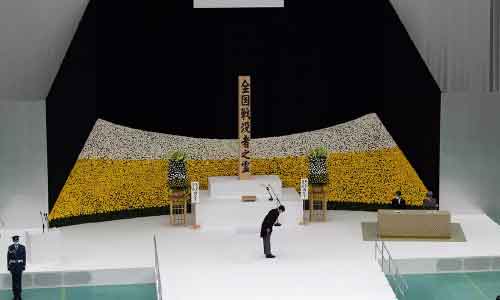TOKYO — Japan on Saturday marked the 75th anniversary of its surrender in World War II, with Emperor Naruhito expressing “deep remorse” over his country’s wartime actions at a somber annual ceremony curtailed by the coronavirus pandemic.
Naruhito pledged to reflect on the war’s events and expressed hope that the tragedy would never be repeated. There was no word of apology from Prime Minister Shinzo Abe, who gave thanks for the sacrifices of the Japanese war dead but had nothing to say about the suffering of Japan’s neighbors.
“Reflecting on our past and bearing in mind the feelings of deep remorse, I earnestly hope that the ravages of war will never be repeated,” Naruhito said in a short speech at the event in Tokyo marking the 75th anniversary of Japan’s surrender on Aug. 15, 1945.
Amid virus fears and worries about the fading memories of the fast-aging war generation, about 500 participants, reduced from 6,200 last year, mourned the dead with a minute of silence. Masks were required, and there was no singing of the “Kimigayo” national anthem.
Naruhito has promised to follow in the footsteps of his father, who devoted his 30-year career to making amends for a war fought in the name of Hirohito, the current emperor’s grandfather.
Abe has increasingly sought to whitewash Japan’s brutal past since taking office in December 2012. He hasn’t acknowledged Japan’s wartime hostilities during Aug. 15 speeches, which had previously been a nearly 20-year tradition that began with the 1995 apology of Socialist leader Tomiichi Murayama.
Abe, in a largely domestic-focused speech, said the peace that Japan enjoys today is built on the sacrifices of those who died in the war. He pledged that Japan will reflect on lessons from history and will not repeat the war devastation. He listed damage inflicted on Japan and its people, including the U.S. atomic bombings of Hiroshima and Nagasaki, massive firebombings of Tokyo and the fierce battle of Okinawa.
“There are many people who don’t know anything about the war, not only the suffering of the Japanese people, but there are also things that Japanese people did, bad things,” Bamba said. “Unless we teach these things to future generations, I don’t think war would end.”
She prayed for her uncle, whose remains have never been found. (AP)
Home » World » Japan Marks 75th Anniversary of War End with No Abe Apology
Japan Marks 75th Anniversary of War End with No Abe Apology

